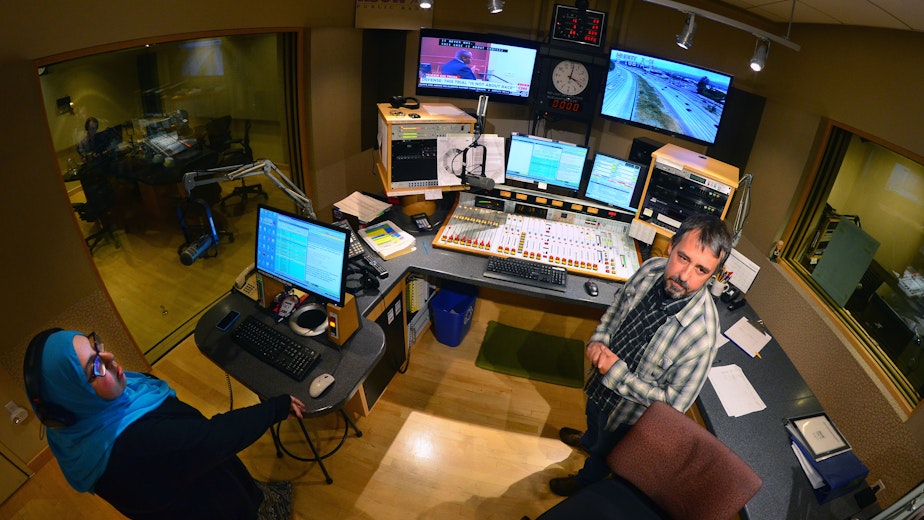So how does KUOW choose on-air sponsors anyway?

Listener Nadya Zimmerman was tuned into KUOW 94.9 FM when she heard a bit of messaging that made her pause.
It was one of those that begins, “Support for KUOW comes from …” and it referenced the CIA and recruiting. It was, in public radio speak, an underwriting spot, or an acknowledgement of a donation. (Whatever you do, don’t call it an advertisement.)
Zimmerman had also heard news stories on our air about Congressional hearings for the appointment of Gina Haspel to be director of the CIA. So Zimmerman asked us: How do we decide who gets an underwriting spot and who gets acknowledged on the air?
What underwriting spots does KUOW air?
After hearing an underwriting spot from the CIA, listener Nadya Zimmerman wanted to know: how does KUOW decide what backers get our airtime? The answer is not as simple as you’d expect, says KUOW Director of Business Support. We also spoke to John Carroll, media analyst for NPR’s Here and Now and professor of communication at Boston University.
We brought this question to KUOW’s director of business support, Dana Faust. She said that besides political messaging or campaigns, no group of KUOW supporters would necessarily be excluded from underwriting KUOW.
“We don’t automatically refuse messages from most organizations. What we do is tightly regulate the message itself,” Faust said.
John Carroll, a media analyst for NPR's “Here and Now” and a professor of communication at Boston University, said there’s an advantage to this tack.
“To be as open as possible to funders and corporate sponsors enables NPR and the member stations to maintain their independence,” Carroll said. “If they were just collecting money from, let’s say, environmentally-sound companies and liberal organizations or corporations, that would put them in a position where they’re more reliant on one of the spectrum than the other.”
It is important to note that people working in the business support department at KUOW may not approach someone from the programming side for a quid pro quo.
“That behavior would absolutely not be tolerated,” Faust said. “That’s not just in this news organization – that’s a principle that’s observed in all credible news organizations.”
Faust said KUOW also guards its messaging by not allowing business supporters to make claims on air that can’t be substantiated.
“We’re perfectly comfortable – and we do it every single day – asking for documentation of claims that they make in business support messages,” Faust said
That’s why you won’t hear messages that say, “We’re the best at this or that.” And even more subtle qualities, for instance “sustainability,” have to be substantiated before they go on our airwaves.
“We feel we owe our listeners that: a careful vetting of these messages, which I should point out are not endorsements,” Faust said. “They’re technically an acknowledgement of a donation to the station.”
Public radio support, Faust said, falls at the intersection between marketing and philanthropy for businesses.
Analyst Carroll said that while that is true, the tone and prevalence of underwriting messages are changing to meet more of the marketing side of that equation.
“For a long time the halo effect associated with public radio was enough for a lot of sponsors,” Carroll said, “it showed them as good corporate citizens.
“But as the media landscape has gotten more and more competitive, I think the marketing has become in many ways more important than the philanthropy. And I think corporate sponsors are looking for the kind of return, the kind of platform, that they get from other media organizations.”
Learn more about business support on KUOW.
Produced for the Web by Kara McDermott.




